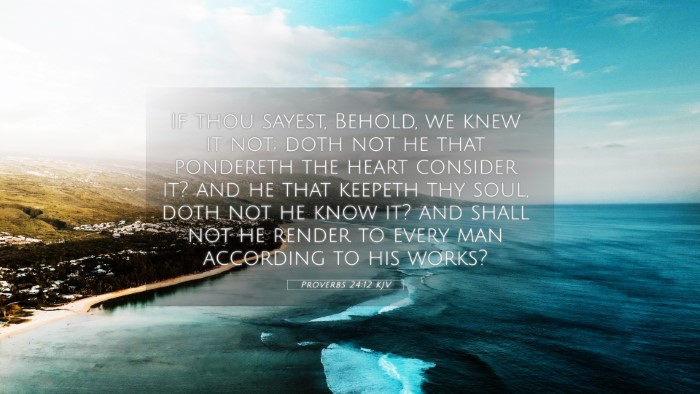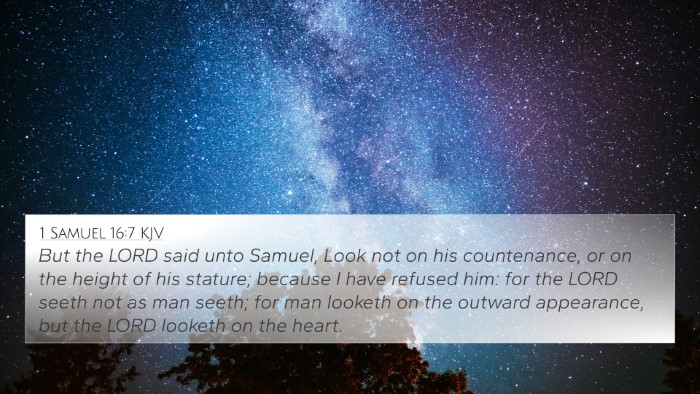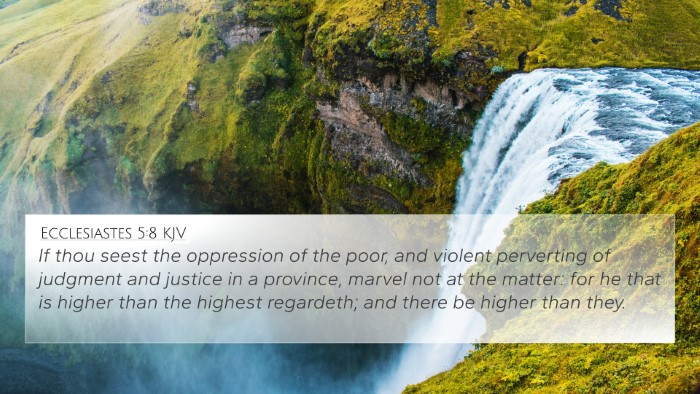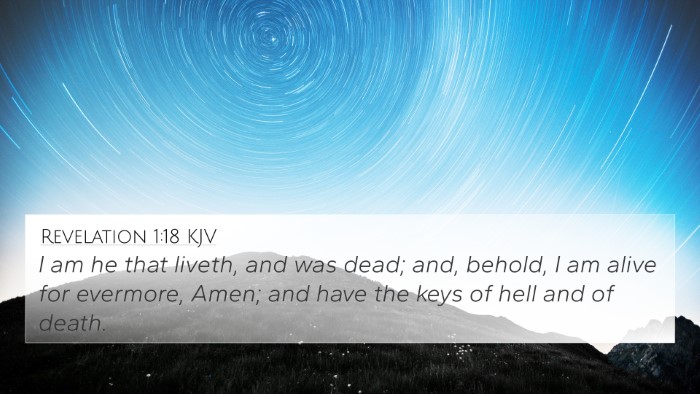Understanding Proverbs 24:12
Proverbs 24:12 states: "If you say, 'Behold, we did not know this,' does not He who weighs the hearts perceive it? And does not He who keeps watch over your soul know it? And will He not repay man according to his work?"
Summary of Meaning:
This verse emphasizes the omniscience of God and the moral accountability of individuals. It serves as a reminder that ignorance is no excuse when one is aware of the moral implications of their actions.
Insights from Public Domain Commentaries
Taking into account the perspectives of commentators like Matthew Henry, Albert Barnes, and Adam Clarke, we can extract profound insights on this verse.
- Matthew Henry: He suggests that this verse highlights human accountability. Even when people claim ignorance, God sees their hearts and understands their true intentions. Henry points out that God will ultimately bring justice according to the deeds done in the body.
- Albert Barnes: Barnes notes the importance of acknowledging wrongdoing. He asserts that individuals cannot hide from God’s judgment. To assure oneself of ignorance is to deceive oneself, as God is fully aware of our actions and thoughts. Such awareness should lead to a life of integrity.
- Adam Clarke: Clarke discusses the idea of divine knowledge, explaining that God perceives the hidden motives of the heart. He also emphasizes that God's judgment will be based on a person's actions and sincerity, urging believers to live justly, as their deeds will be examined.
Cross-References for Proverbs 24:12
Exploring the connections between Bible verses can deepen our understanding of the themes present in Proverbs 24:12.
- 1 Samuel 16:7: "For the Lord sees not as man sees: man looks on the outward appearance, but the Lord looks on the heart." - This verse reinforces the concept that God evaluates not visible actions but internal motivations.
- Psalm 44:21: "Would not God discover this? For he knows the secrets of the heart." - This reiterates that God is aware of hidden things and will act accordingly.
- Jeremiah 17:10: "I the Lord search the heart and test the mind, to give every man according to his ways, according to the fruit of his deeds." - This highlights God’s role in knowing and judging human actions.
- Romans 2:6: "He will repay each person according to what they have done." - Here, Paul affirms the idea of divine repayment based on one's deeds, reflecting the moral implications emphasized in Proverbs 24:12.
- Hebrews 4:13: "And no creature is hidden from his sight, but all are naked and exposed to the eyes of him to whom we must give account." - This underscores God's omniscience and the accountability that comes with it, similar to the message in Proverbs 24:12.
- Galatians 6:7: "Do not be deceived: God is not mocked, for whatever one sows, that will he also reap." - This connects the concept of actions leading to consequences, affirming the theme of the verse.
- James 4:17: "So whoever knows the right thing to do and fails to do it, for him it is sin." - This emphasizes moral responsibility and its repercussions, resonating strongly with the message in Proverbs 24:12.
- Proverbs 15:3: "The eyes of the Lord are in every place, keeping watch on the evil and the good." - This verse supports the idea of God’s surveillance over human conduct.
- Job 34:22: "There is no gloom or deep darkness where evildoers may hide themselves." - Job underscores the impossibility of escaping divine observation, akin to the admonition in Proverbs.
Thematic Connections and Implications
The themes of accountability, divine omniscience, and moral integrity are prevalent throughout the biblical text. By studying Proverbs 24:12 alongside the mentioned cross-references, one can glean a rich understanding of how both the Old and New Testaments discuss moral responsibility and God's oversight.
Furthermore, the cross-references provide various tools for Bible cross-referencing, allowing readers to engage in cross-reference Bible study effectively. It is essential for those interested in comprehensive Bible cross-reference materials to explore these interconnections using a Bible concordance or Bible reference resources.
Practical Applications
Understanding Proverbs 24:12 can encourage believers to live with a heightened awareness of their actions and to foster attitudes of sincerity and integrity.
Here are practical steps believers can take:
- Self-Reflection: Regularly examine one's own heart and actions in light of God's omniscience.
- Accountability: Engage in fellowship with others who can provide insight and help in maintaining integrity.
- Bible Study: Utilize cross-referencing Bible study methods to enrich understanding and discover related themes.
- Sincere Prayer: Pray for God to reveal any hidden motives and guide towards righteousness.
- Active Righteousness: Commit to doing good, knowing that all actions are being observed by God.
Conclusion
Proverbs 24:12 serves as a powerful reminder of the moral responsibilities each individual carries, complemented by the conviction that God's judgment is based on an awareness of the inner workings of the heart. Through scriptural cross-referencing and a comparative analysis of related verses, one can deepen their understanding of this important biblical concept.
Engaging with this scripture can lead to profound insights on how to navigate life with integrity and accountability, echoing the essential biblical truth that our actions bear consequences, overseen by the all-knowing God.


























